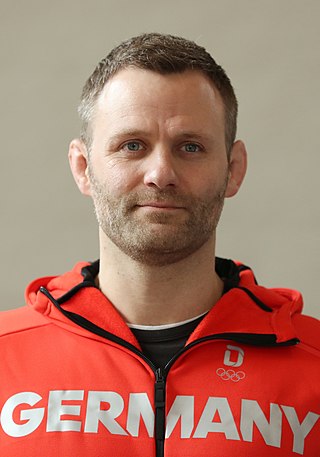
The World Judo Championships are the highest level of international judo competition, next to the quadrennial judo events at the Summer Olympic Games. The world championships are held by the International Judo Federation annually, except the calendar years of the Summer Olympics. Qualified judoka compete in their respective categories as representatives of their home countries. Team fixtures have also been held since 1994. The men's championships first took place in 1956, though the format and periodicity of the competition have changed over time. The last edition of the World Judo Championships (2024) was held in Abu Dhabi, United Arab Emirates.
Judo competed in eight different weight classes for men and women at the 2006 Asian Games in Doha, Qatar. All competition was held in the Qatar Sports Club Indoor Hall.
Abdullo Tangriev is an Uzbek judoka. He won a silver medal in the +100 kg category at the 2008 Olympic Games.
Daniela Yael Krukower is a former judoka from Argentina.
The 2003 World Judo Championships were the 23rd edition of the World Judo Championships, and were held in Osaka, Japan 11–15 September 2003. On the last day of competition, team events were held, as France won the men's team event and Japan won the women's.
Yoon Dong-Sik, often anglicised to Dong-Sik Yoon, is a South Korean judoka, and mixed martial artist.

Ole Bischof is a German judoka. He is trained by 1984 Olympic gold medalist Frank Wieneke.

Jeon Ki-young is a retired judoka who competed in the –78 kg and –86 kg divisions.
The Judo competition at the 2002 Asian Games was contested in sixteen weight classes, eight each for men and women at the Gudeok Gymnasium.
The Judo Competition at the 1994 Asian Games was contested in sixteen weight classes, eight each for men and women. This competition was held from October 12 to October 15, 1994.
The Judo competition at the 1990 Asian Games was contested in sixteen weight classes, eight each for men and women.
The Judo competition at the 1986 Asian Games was held at Saemaul Sports Hall from 1 to 4 October 1986 and contested in eight weight classes, for only men. This was the first competition of Judo for Asian Games.

At the 2001 East Asian Games, the athletics events were held in Osaka, Japan from 23 to 26 May 2001. A total of 45 events were contested, 23 by male and 22 by female athletes. All events were held at the Nagai Stadium, with the exception of the racewalking and half marathon events. A team of Australian athletes took part in the competition but they were excluded from the medal tally. This was the last time that Kazakhstan competed in the competition.
East Asian Judo Championships is the Judo East Asian Championship organized by the Judo Union of Asia.
Judo has been an event at the East Asian Games since 1993 in Shanghai, China.
Mayumi Yamashita is a Japanese judoka.
Lee Bok-hee is a South Korean judoka, who competed in the women's half-middleweight category. She won fourteen medals in her career, including a silver in the 2001 East Asian Games in Osaka, Japan, achieved fifth-place finishes at the 2003 World Judo Championships, and represented her nation South Korea in the 63-kg class at the 2004 Summer Olympics.
Egamnazar Muftillayevich Akbarov is an Uzbek judoka, who competed in the men's lightweight category. He picked up a total of eight medals in his career, including a gold from the 2001 Summer Universiade in Beijing, China and a bronze from the 2002 Asian Games in Busan, South Korea, and represented his nation Uzbekistan in the 73-kg class at the 2004 Summer Olympics.

Saeid Mollaei is an Iranian-born Mongolian half-middleweight judoka. He was born in Tehran to ethnic Azerbaijani parents originally from Khoy. Iranian authorities ordered Mollaei to lose intentionally in the semi-final at the Tokyo 2019 World Championships, so as to avoid a potential match in the finals against Israeli 2019 world champion Sagi Muki. In August 2019, he moved to Europe with a two-year visa from Germany, saying he was afraid to return to Iran after exposing and criticizing its pressure on him to deliberately lose in the World Championships. In December 2019, he became a citizen of Mongolia. He dedicated his 2020 Olympic medal to Mongolia, to the Mongol people, and to Israel. From May 2022 on, Mollaei represents Azerbaijan.
Andrey Shturbabin is an Uzbekistani judoka. He competed at the 1996 Summer Olympics and the 2000 Summer Olympics.





